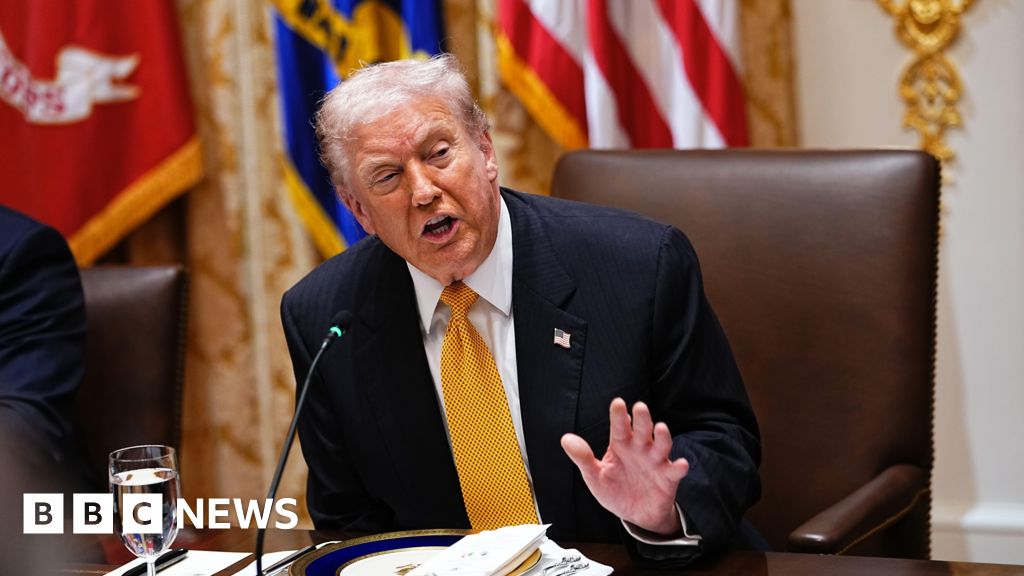US to boycott G20 in South Africa, Trump says

US to Boycott G20 Summit in South Africa Over 'Persecution' Claims
The United States will not participate in the upcoming G20 summit in South Africa, former US President Donald Trump has announced. This decision stems from what he described as a "total disgrace" that South Africa is hosting the meeting, citing unsubstantiated claims of widespread persecution of white people, specifically Afrikaners, in the country.
The G20 summit, a gathering of leaders from the world's largest economies, is scheduled to take place later this month in Johannesburg. The US was slated to assume the G20 presidency after South Africa.
South Africa Responds with Disappointment, Rejects Claims
South Africa's foreign ministry has expressed its regret over the US decision, firmly rejecting the allegations of persecution. In a statement, the ministry emphasized that the characterization of Afrikaners as an exclusively white group is "ahistorical" and that the claim of persecution lacks factual basis.
"The South African government wishes to state, for the record, that the characterisation of Afrikaners as an exclusively white group is ahistorical. Furthermore, the claim that this community faces persecution, is not substantiated by fact," the statement read.
Trump's History of Comments on South Africa
This is not the first time Trump has made such claims regarding South Africa. Since returning to the political stage, he has repeatedly accused the country of discriminating against its white minority. In May, he reportedly confronted South African President Cyril Ramaphosa about the issue in the Oval Office.
During his presidency, the Trump administration even considered granting Afrikaners refugee status, citing a purported "genocide" taking place in South Africa. This offer saw "limited uptake" by South Africans, a fact the South African government has pointed to as evidence against the veracity of the claims.
The "White Genocide" Narrative: A Discredited Conspiracy Theory
The narrative of a "white genocide" in South Africa is a long-standing conspiracy theory that has been widely debunked by academics, journalists, and fact-checkers. It often circulates within far-right circles and online forums, alleging that white farmers are being systematically targeted and killed.
Dr. Liesl Louw-Vaudran, a Senior Researcher at the Institute for Security Studies in Pretoria, notes that while farm murders are a serious problem in South Africa, they are not racially motivated. “The notion of a 'white genocide' is a dangerous and misleading exaggeration. While violent crime is a pervasive issue affecting all communities in South Africa, there's no evidence suggesting that white farmers are disproportionately targeted based on their race,” she explains.
South African Courts Dismiss Claims
In February, a South African court dismissed the claims of a "white genocide" as "clearly imagined," further undermining the narrative.
G20's Role and South Africa's Participation
Founded in 1999 in response to the Asian financial crisis, the G20 comprises nations holding more than 85% of the world's wealth. Its primary aim is to foster international economic stability.
The first leaders' summit was held in 2008 following the global financial turmoil, with the goal of promoting international cooperation. Leaders and representatives from the European Union and African Union meet annually to discuss global economic issues and challenges.
South Africa's participation in the G20 is significant, representing the African continent's interests within this influential forum. The country has been a member since 2008 and plays an active role in shaping the group's agenda on issues such as sustainable development, climate change, and trade.
Dr. Siphamandla Zondi, a professor of International Relations at the University of Johannesburg, believes the US boycott could undermine the G20's legitimacy. "The G20's strength lies in its inclusivity and the representation of diverse perspectives. A boycott by a major power like the US sends a negative signal and could weaken the organization's ability to address pressing global challenges effectively," he argues.
Implications for US-South Africa Relations
The US decision to boycott the G20 summit is likely to further strain relations between the two countries. While the long-term impact remains to be seen, it highlights the ongoing challenges in navigating differing perspectives on issues of race, identity, and human rights.
The US will not attend the G20 summit in South Africa. Trump cites 'persecution' of white people as the reason. South Africa rejects the claims as unsubstantiated. The 'white genocide' narrative is a widely discredited conspiracy theory. The boycott could strain US-South Africa relations.
Originally sourced from: BBC News Africa
